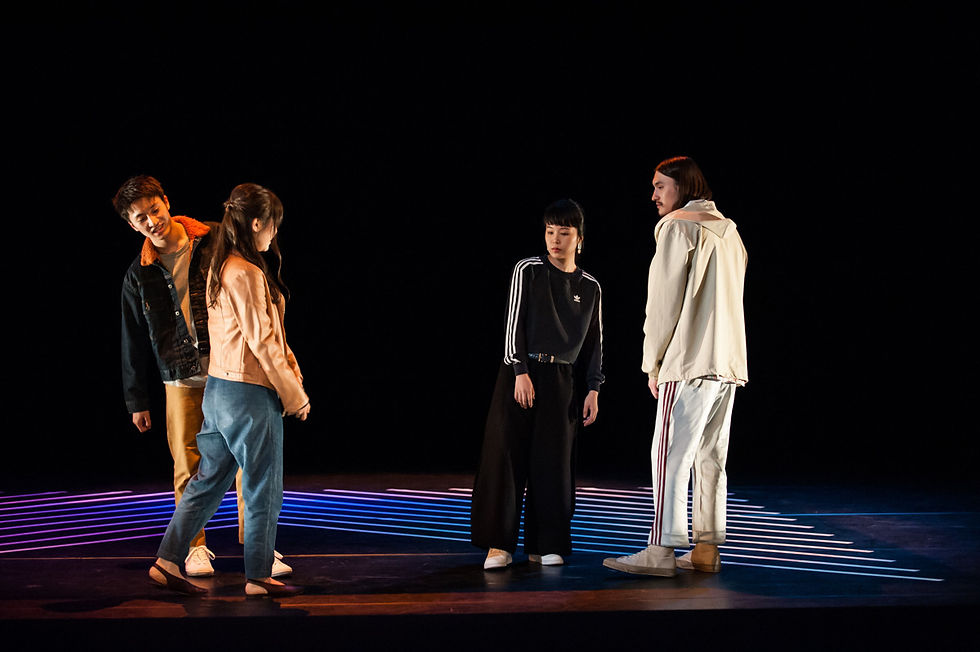RICARDO FRAYHA
producer | curator | cultural manager

©Hideto Maezawa

©Hideto Maezawa

©Els De Nil

©Els De Nil

©Hideto Maezawa

Theatre | GUEST PERFORMANCE | 2018
TOSHIKI OKADA
CHELFITSCH
Five Days in March
(re-creation)
Five Days in March depicted the everyday activities of a few young Japanese couples over a period of five days spanning March 21, 2003, when the United States began bombing Iraq. It underscored the vague uneasiness felt by Japanese society in the contrasting structure of war in a faraway land and the "everyday" of Japanese youth. With its script mirroring the actual colloquialisms of speech by young Japanese, its use of discourse changing character and space in the middle of an actor's lines, and its physical expression exaggerating subconscious gestures and other body movements, the work shook the framework of theatre that had thus far been taken for granted to its very foundations, and sent shockwaves through Japan's contemporary theatre world. Five Days in March won the 49th Kishida Kunishi Drama Award in 2005 and had its first performance outside Japan at the Kunstenfestivaldesarts in 2007. It has since been staged in more than 30 cities around the world. As one of chelfitsch's banner works, it continues to be given the highest accolades inside and outside Japan, and is widely recognized as a landmark turning point in contemporary Japanese theatre. The ten-plus years following the debut of Five Days in March have seen a worldwide trend toward nationalism and a stream of terrorist attacks that are gradually nearing our "every day." In the process, the perceived distance from war and street protests has rapidly narrowed. Today's Japanese youth differ greatly from the picture of apathetic young depicted in the previous work at the time of the attack on Iraq. Since the 2011 Great East Japan Earthquake, there has been an increase in protests and demonstrations led by youth, who are now speaking out as social principals themselves. For this re-creation of Five Days in March, auditions were held for selection of only young actors in early 20s. Japanese youth in this age group unavoidably feel the shadow of war approaching and live with a sense of changes in society as things affecting their own lives. What actuality comes into view when they act out "apathy"? The re-creation will open up new vistas in work thanks to young bodies in contemporary clothing.
TOSHIKI OKADA
Born in Yokohama in 1973 and formed the theatre company chelfitsch in 1997. Since then he has written and directed all the company's productions, practising a distinctive methodology for creating plays, and has come to be known for his use of hyper-colloquial Japanese and unique choreography. In 2005, his play Five Days in March won the prestigious 49th Kishida Drama Award, and Air Conditioner, was a finalist at the Toyota Choreography Awards 2005. In February 2007 his collection of novels The End of the Special Time We Were Allowed debuted and was awarded the Oe Kenzaburo Prize. While his stories and plays continue to be published in Japan, his works have also been translated into many languages and published abroad. He was recently commissioned to direct his works in a repertory program at the Munich Kammerspiele, one of the foremost theaters in Germany, for three seasons starting in 2016.
FIVE DAYS IN MARCH (RE-CREATION)
Playwright, Direction: Toshiki Okada | Performers: Chieko Asakura, Riki Ishikura, Yuri Itabashi, Ayaka Shibutani, Ayaka Nakama, Leon Kou Yonekawa, Manami Watanabe | Set Design: TORAFU ARCHITECTS
Technical Director: Koro Suzuki | Stage Director: Daijiro Kawakami | Lighting Director: Tomomi Ohira (ASG) | Sound Director: Norimasa Ushikawa | Costume: Kyoko Fujitani (FAIFAI) | Assistant Director: Mana Inukai
Associated production: precog co.,LTD. | Executive Producer: Akane Nakamura | Chief Producer: Tamiko Ouki | Chief Administratior: Mihoka Kawamura | Production Manager: Mai Hyodo | Production Assistant: Megumi Mizuno | Administration Assistant: Takafumi Sakiyama, Minami Kambe | Production Coordinator: Yuka Sugiyama
Production: chelfitsch, KAAT Kanagawa Arts Theatre | Co-produced by: KAAT Kanagawa Arts Theatre, ROHM Theatre Kyoto, Kunstenfestivaldesarts | Additional Commissioning Support provided by: Toyohashi Arts Theatre PLAT, Nagano City Arts Center, Yamaguchi Center for Arts and Media [YCAM] | Residency Support: Toyohashi City, Toyohashi Arts Theatre PLAT | In Co-operation with: Steep Slope Studio, Kinosaki International Arts Center
Production in Brazil: prod.art.br | Production directors: Ricardo Frayha, Ricardo Muniz Fernandes | Technical director: Julio Cesarini
Realisation: Sesc São Paulo
Sesc Bom Retiro
São Paulo, SP, Brazil
09 to 11/11/2018